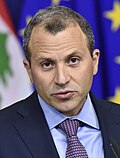The registration process for Lebanese expatriates to vote in the 2026 Lebanese parliamentary elections saw the launch of a new dedicated online platform by the Ministry of Foreign Affairs and Emigrants. The initiative aimed to significantly increase diaspora participation and streamline the logistical process for voting abroad. [20]
Launch and Mechanism
On October 2, 2025, the Minister of Foreign Affairs and Emigrants, Youssef Rajji, officially announced the opening of the digital voter registration platform. [21] This launch was a collaborative effort with the Ministry of Interior and Municipalities, designed to implement the provisions of Lebanon’s electoral law concerning non-resident citizens.
The registration period commenced immediately following the announcement, running from October 2, 2025, until November 20, 2025 (midnight Beirut time). Eligible citizens—those born on or before March 30, 2005—are required to register their intent to vote at a specific Lebanese embassy or consulate in their country of residence.
The online platform, accessible via the Foreign Ministry’s official website, requires applicants to provide personal details, verify their existing information on the electoral rolls, and upload mandatory documentation:
- A Lebanese identification document (ID card, valid or expired passport, or civil status record).
- A proof of residency outside Lebanon (e.g., residency permit, foreign ID, or foreign driver's license).
The platform was intended to clarify and accelerate the registration process, particularly in anticipation of a high turnout following the significant participation observed in the 2022 elections. [22]








